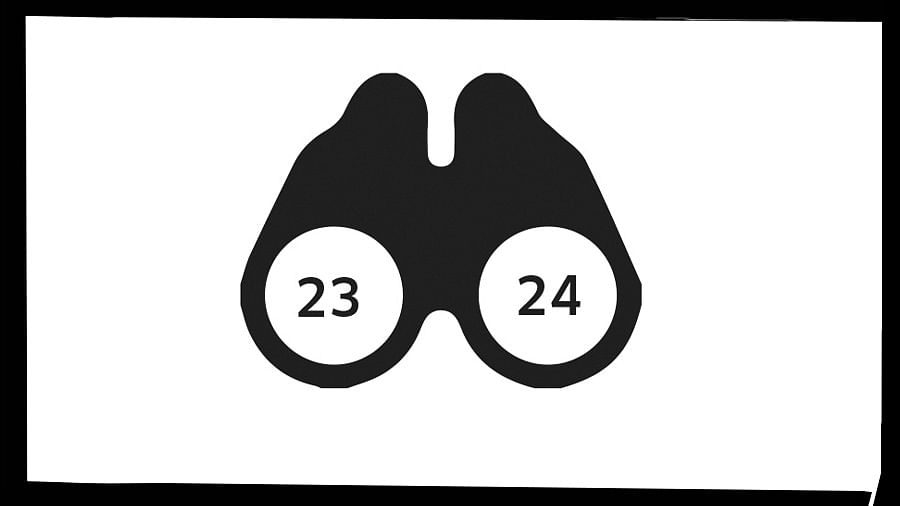
DH Illustration.
The much-awaited elections to the five state assemblies starts on Tuesday with the denizens of Mizoram and a portion of those in Chhattisgarh exercising their franchise. Besides these two states, new legislators will be elected in Madhya Pradesh, Rajasthan and Telangana by the time the polls close on November 30.
Much focus is on the promises made by competing political parties, with the party in government hoping to renew the mandate for another term, while those in the Opposition are working to garner a majority in the Assembly. The December 3 results will be important, not just for the states that are going to the polls this month but also in that it will show the direction of the political wind, so to say, as the parties gear up for the 2024 Lok Sabha elections.
In the midst of a high-octane campaign, the BJP announced a major shift of strategy. It decided to field several senior party leaders and sitting Members of Parliament in the Assembly elections to Chhattisgarh, Madhya Pradesh, Rajasthan and Telangana.
One can decipher a Karnataka connection with the BJP leadership’s decision to enter the electoral arena with its best team rather than experimenting with fresh faces. The Karnataka effort did not have the desired effect and the BJP overplayed its hand. Though the party retained its vote share, the number of seats came down and today the BJP is struggling to find a Leader of Opposition in the Assembly.
For the current round of elections, the BJP has fielded seven MPs each in Madhya Pradesh and Rajasthan, four in Chhattisgarh, and three in Telangana, along with a clutch of senior party leaders who were directed to pad-up.
The move did raise eyebrows in many quarters, prompting a candid confession by senior BJP leader Kailash Vijayvargiya who entered the fray from one of the constituencies in Indore city in Madhya Pradesh. The BJP leader has spent a lifetime in the city and has served as its Mayor, too, and was once considered a serious challenger to Chief Minister Shivraj Singh Chauhan.
The central message of the plan was the determination of the party to reinforce its chances of retaining power in the state, which it lost narrowly to the Congress five years ago but clawed back after Jyotiraditya Scindia crossed over from the Congress to the BJP along with 22 MLAs of the former. According to reports emanating from the state, the BJP government is battling to hold on to its turf as the Congress under veteran Kamal Nath is mounting a stiff challenge. Former Chief Minister Kamal Nath, who was displaced by Chauhan, now has a strong backing of another Congress stalwart of the state, Digvijaya Singh.
The BJP leadership has sent an unambiguous message that seniors will have to throw their weight behind the effort and convert even less than half a chance into an electoral victory.
This reduced the usual tactics by senior leaders who jostle with the party leadership for tickets for their band of supporters. This altered strategy will mean that there would be less chances of dissidence and the supporters angling for tickets will not turn sullen or rebel when they are denied a party nomination.
The experiment of changing sitting legislators was started by Prime Minister Narendra Modi in his previous role as Chief Minister of Gujarat. During the last nine years, this experiment was replicated in many Assembly elections and the BJP reaped electoral dividends in some of them.
Yet, in two back-to-back elections, in Himachal last Autumn and later Karnataka in May this year, the flaws in this approach showed. In Himachal Pradesh, some influential leaders or legislators who were denied tickets either entered the contest or created hurdles for the party nominees in the fray. As a result, the BJP lost the election and the Congress was back in the saddle.
The gambit with senior leaders in the current round of elections fits in with the BJP national leadership’s idea to step into the Assembly elections without a formal declaration of its chief ministerial candidate. As has been the case during the past few years, the party will be projecting the determined leadership of Prime Minister Modi and his promise of how a BJP ‘double-engine’ government in the states would complement the Centre to deliver on promises.
This formulation assumes importance in the Hindi-speaking states of Chhattisgarh, MP and Rajasthan. In MP, should the BJP win a majority, there is uncertainty over the continuation of Chief Minister Shivraj Singh Chauhan, and in Rajasthan, the party central leadership has so far resisted intense pressure by senior leader and former Chief Minister Vasundhara Raje to declare her as the CM candidate.
Among the MPs, for instance, the BJP asked erstwhile royal Diya Kumari to contest from one of its safest seats in Jaipur city. The perception is that she could be a possible candidate to lead the government, should the party form the next government.
In Chhattisgarh, after the eclipsing of former Chief Minister Raman Singh and in the absence of any credible alternative, the BJP faces a crisis of leadership and ground reports indicate that the Congress government of Bhupesh Baghel is set to put up an impressive performance at the polls.
In Telangana, after challenging the Bharat Rashtra Samiti government for the last few years, the BJP is now trailing in the third spot. Missing among the MPs in the fray is state party chief and Union Minister G Kishan Reddy.
Overall, the BJP’s opponents, especially the Congress, interpret its move of roping in sitting MPs/Union Ministers as a sign of nervousness. But the move could be the BJP’s way of testing the waters in its strongholds in the Hindi belt ahead of the Lok Sabha elections. In each of these three states -- Chhattisgarh, MP and Rajasthan -- it is essentially a battle between the two national parties, the BJP and the Congress.
(The writer is a senior journalist based in New Delhi)